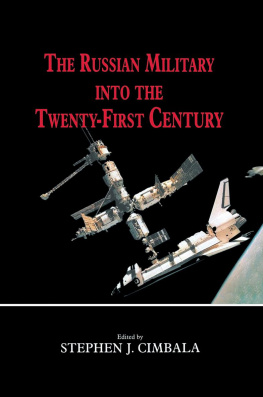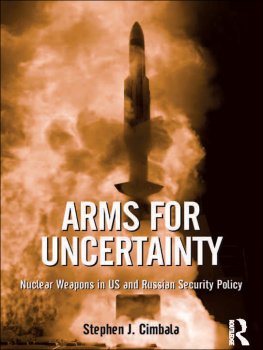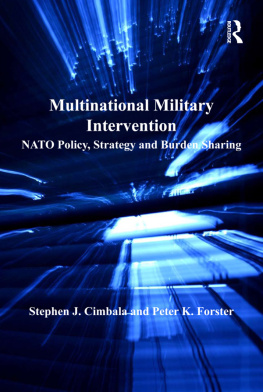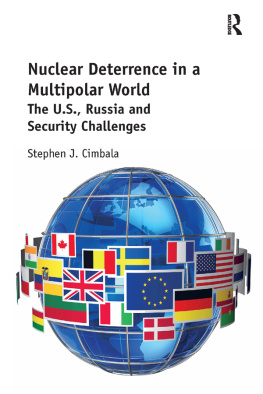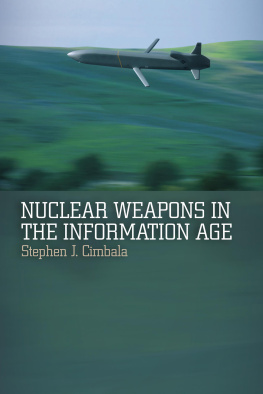First published 1995 by
FRANK CASS & CO. LTD.
Published 2013 by Routledge
2 Park Square, Milton Park, Abingdon, Oxon OX14 4RN
711 Third Avenue, New York, NY, 10017, USA
Routledge is an imprint of the Taylor & Francis Group, an informa business
Copyright 1995 Stephen J. Cimbala
British Library Cataloguing in Publication Data
Cimbala, Stephen J.
US Military Strategy and the Cold War
Endgame
I. Title
355.033573
Library of Congress Cataloging in Publication Data
Cimbala, Stephen J.
US military strategy and the Cold War endgame / Stephen J. Cimbala.
p. cm.
Includes bibliographical references and index.
1. United StatesDefenses. 2. EuropePolitics and government1989 I. Title.
UA23.C5437 1995
355.033573dc20
94-17487
CIP
ISBN 13: 978-0-714-64556-8 (hbk)
ISBN 13: 978-0-714-64117-1 (pbk)
All rights reserved. No part of this publication may be reproduced in any form or by any means, electronic, mechanical, photocopying, recording or otherwise, without the prior permission of the publisher.
Typeset by Regent Typesetting, London
It is now a truism to restate Santayanas aphorism that those who do not remember the past are condemned to repeat it. For historians and political scientists, among other interested students of public policy, the more subtle question is how the past is to be interpreted. Which past is relevant to the present? For a Europe looking forward into a potentially new security community in which the expectation of major war among great powers might be almost non-existent, the Cold War past offers only some of historys full brew. Nevertheless, because the Cold War is so recent, it has been subjected to the normal risk of historical and political misconstruction attendant upon any recent event.
This study argues that the future of European security will not completely escape the clutches of Cold War experience and recent past decisions taken by the great powers, especially the Americans and the Russians. The Soviet Union gave way in 1991 to the Commonwealth of Independent States and to Russia as a great power, symbolized in Russias inheritance of the Soviet United Nations Security Council seat. A power- and policy-vacuum now exists in east and central Europe as a result of Soviet disintegration and military retrenchment also passed along to Russia. Russia finds itself hard-pressed to maintain economic and political viability, including the challenge of internal stability and border security. The fulcrum of conflict in Europe shifts eastward as a result of Cold War termination, from the inner German border to the lands of east, central and southern Europe. Although the shifting axes of potential conflict differ considerably from those of the Cold War years, the post-Cold War period carries forward from the past difficult and unresolved security issues.
Among these issues carried forward is the post-Cold War responsibility of the Americans for European security, and within that broader question, the narrower question of how any future American security guarantee for Europe can be implemented. From 1945 until 1990, it seemed self-evident that the US, through its membership in, and domination of, the North Atlantic Treaty Organization (NATO), would provide for the territorial integrity and political independence of Western Europe. After 1967 and the official adoption of flexible response strategy by NATO, the alliance sought to deter an outbreak of war in Europe by making certain that it had options, including if necessary nuclear options, for repelling any aggression or for inflicting unacceptable punishment on the aggressor. Although providing the forces and plans to carry out these missions was demanding of political leaders and military planners, the obvious Soviet challenge of political advancement through military intimidation forced a cohesion within NATO which kept the US connected to European security.
As discussed in Preparedness for global war against the Soviet Union, a war which in all likelihood would begin in Europe, mandated numbers of standing divisions, fleets and air wings which would allow the United States to fight one major war in Europe and one or more wars outside of Europe, say in Korea and/or the Middle East/Southwest Asia theaters of operations. During the Kennedy years this ambition extended to two and a half wars which the US would be able to fight simultaneously: major wars against the Soviet Union and against China, plus a half war in the Middle East or South Asia. Kennedys successors scaled down these ambitions in the aftermath of US Vietnam disengagement. A notional one and a half war strategy prevailed during most of the 1970s and 1980s, on the assumption that forces adequate to hold off Soviet attackers in Europe would also be adequate to win rapid and decisive victories outside of Europe.
The assumption of transferable power among theaters of strategic military action may have been reasonable for conventional wars. But low-intensity conflicts, including insurgencies and revolutionary movements which were sometimes supported by Moscow, posed a challenge to the US and its NATO allies of uncertain dimensions. Therefore, it called forth an uncertain response. Some US diplomats, political leaders and military planners felt that the focus of defense and security preparedness should remain uppermost in Europe. Other US leaders felt that low-intensity conflicts now took center-stage once the basic Cold War alignments on either side had settled in. It could not be denied that low-intensity conflicts were more numerous than interstate wars, but it was far from obvious what the US or other developed armed forces could do about them.
US Vietnam experience was subject to a variety of interpretations in this regard. Some contended that the US had actually inflicted military defeat on the Viet Cong insurgent forces, but lost the war owing to political opposition and decision mismanagement at home.2 Others, including those in the first group, also indicted the US Army for its disregard of classical military strategy and campaign proficiency in favor of theories of graduated deterrence and political action. As Colonel Harry G. Summers, Jr., US Army (Ret.), wrote in his widely acclaimed book:
In justifying strategy in civilian strategist terms, the Army surrendered its unique authority based on battlefield experience there was an increased emphasis on technical, managerial, and bureaucratic concerns. Instead of being experts in the application of military force to achieve the political ends of the United States, we became neophyte political scientists and systems analysts and were outclassed by the civilian professionals who dominated national security policy.3
Much of this professional military disinterest in classical strategy was the result of military men understandably looking to their civilian superiors for clues about the kinds of analyses that the civilians would find most congenial. The nuclear age had made major war too risky and the problem of preserving stability in Europe or globally became defined as one of making deterrence work. The omnivorous potential of US and Soviet nuclear weapons did not, despite the lay image of overkill, make governments on either side complacent about deterrence stability. Instead, during the Cold War years each side sought to increase its own deterrent potential and to hold constant, or to decrease that of its opponent. The architecture of deterrence and arms control became understandable, and in some ways unavoidable, substitutes for military art.




